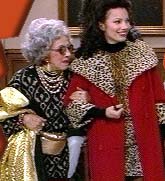|
|
|
|
Jewish World Review July 14, 1999/ 1 Av, 5759
Elliot B. Gertel
Oy Vey!
Not surprisingly, the last episode, about the delivery of Nanny Fran's twins, was
the most poorly written and dragged out ever, so overdoing the pregnancy
and childbirth pitfalls and jokes that the occasion actually became an
ordeal and a labor for the audience!
Yet the writers of that last episode, veterans Caryn Lucas, Frank Lombardi
and Peter Marc Jacobson (Drescher's producer husband) remained true to form
with the one-liners: Maxwell's first wife never experienced bloating and
swollen ankles because she "gave birth to Gentiles." The delivery will be
difficult because it's hard to "get a Jewish kid to leave his mother." Fran
gets to give birth around her first anniversary, but her grandmother Yetta
had to flee Poland on hers, etc., etc., ad nauseam - or at least until the
final credits of the final episode, which was well past nauseam.
The Nanny ended blandly and uninspired. It began with the cleverest and
funniest first episode of a TV sitcom. And in between there was constant
tension, at first a healthy tension between the power of tradition and
family and the pull of assimilation and acceptance by the Gentile elite,
between pointed satire and tasteless double entendre, between gentle,
self-aware humor and cruel slapstick. For the first several episodes of the
first season, the writers and cast were able, by and large, to let those
tensions work for them, with creativity, humor and what the fine opening
song called a "flair."
First, Maxwell's butler and female business partner became receptacles of
physical and verbal abuse and, by the final episode, were put through the
paces of a humiliating marriage in the labor room and then of an indelicate
revelation of their own premature "family way."
Then, Maxwell's children became reduced more and more to props and to
slapstick buffoonery. In the last episode, the older two were whisked off
and the younger one seemed to be acquiring some nanny duties of her own.
The treatment of Grandma Yetta degenerated so badly through the seasons
that by the last episode she had become the ninny, working the candy
machine at the hospital thinking it was a Las Vegas slot machine, and
totally oblivious and perhaps indifferent to the pending birth of her twin
great-grandchildren.
During the last season, the one-liners multiplied
making Yetta the butt of jokes about social security theft, lesbianism, and
interracial dating. (The Hanukkah episode for 1998 had Fran telling Yetta
to play with her chocolate dreidl, referring to her black boyfriend from
the nursing home, portrayed by Ray Charles).
Jokes about Jewish rituals prevailed but began to level off by the last
season. How many Jewish rituals do a general audience recognize enough to
get jokes? How many times can we hear about the butler, Niles, making a
sausage patty yarmulke for Rosh Hashanah (to take one example from writer
Jayne Hamil)? When Yetta's boyfriend, Sammy, asks, "Why is it that Jewish
holidays start after sundown?" (the Hanukkah episode), Fran replies, "G-d
knew that wearing sequins before five is gauche." Fran takes the menorah
lighting seriously, but sees that the Maoz Tzur hymn is replaced by Ray
Charles singing "I'll be Home for the Holidays."
The Nanny sunk to the maudlin when it tried to take Jewish rituals
seriously, particularly in the last season. Thus, in an episode about
Maxwell's former in-laws refusing to accept Fran as the new mom for their
uppercrust WASP grandchildren, also by writer Jayne Hamil, Fran tries to
win the hearts of all by lighting a yahrtzeit candle for Maxwell's first
wife.
She explains that the candle is lit on the deceased's birthday (actual
ly, on the anniversary of the death!) in order to "light the way for a
happy afterlife." The information is not only misleading, but a wholesale
use of Jewish ritual for the self-serving end of being accepted into a
Gentile family!
Now Hamil does have Maxwell insist that his parents are "not anti-Semitic.
They're best friends with the Rothschilds." So at the very best, Fran is
using Jewish rituals to be accepted into the upper crust and not
necessarily to assimilate.
Such loss of dignity for every character and on any topic (particularly
Judaism) was the unavoidable lot of The Nanny's increasingly uncontrolled
over-indulgence in American Jewish "inside" jokes. What we saw here was
like an addiction, a "substance abuse" of old one-liners without substance.
We never even saw Fran's dad because he was one continuous "Jewish"
bathroom joke.
By the end of March, TV Guide announced an episode in which "Sylvia (Renee
Taylor) is having an affair with a doctor (Joseph Bologna), which leads to
a 'breakup' with Fran and the revelation (for the first time) of the face
of Fran's father, Morty (Steve Lawrence)." That episode was, however,
yanked out of the announced time, due, according to some media reports, to
network concerns about the lack of taste in several of the series's last
episodes.
If this is so, how fascinating that TV execs would take a stand against
undignified excesses with "Jewish" doctor jokes! Oddly, The Nanny formula
proved good for only one thing --- namely, political satire. An episode on a
ski weekend spent with Bill and Hillary Clinton, written by Dan and Jay
Amernick, utilized the show's double entendres (which were never suited to
its time slot and alleged family themes) with far greater skills than one
saw even on the old Murphy Brown series.
The final episode minded its p's and q's, but was unable to hide the
blatant indignities that resulted from the choice of overdosing on the
one-track humor rather than maintaining a creative tension and a sense of
Jewish apartness. But Drescher and Company did manage to say their final
piece in the last season: What do you want of us? they protested. Our Jews
may have no class, but they are warm. Maxwell bonds with his new
mother-in-law, Sylvia, when Fran's parents are temporarily rendered
homeless by an angry relative (O, how cruel those Jewish relatives on The
Nanny can be) because Maxwell's mother left the Baby Maxwell in a garden
whenever he cried so that he would stop crying.
In the most recent Hanukkah-Christmas episode, we see how cold Maxwell's
father was to him at Christmas dinners, and how warm Fran's mother and
(albeit invisible) dad were to her in taking off to the warm climate of
Florida with her. That same episode suggested that Maxwell's British
sister-in-law showed no emotion when she found out that her boyfriend was
hiding the fact that he was a married man, but went into ecstasy when she
discovered a vintage brand of liquor while visiting.
The strategy is clear: We may stereotype Jews as a bit declassé, but the
Brits are cold and unfeeling. Jews may be a bit crass and materialistic,
but they do have warmth and humor. Brits may be dignified and proper, but
they are cold boozers. The problem with such "strategy" is that it is the
first clause, and not the "but" clause that remains with the viewer.
And
that, I fear, is the lasting legacy of The
06/07/99: Suddenly Susan's Death of a Rabbi
 May 'The Nanny,'
May 'The Nanny,'
R.I.P. --- not!
 But then the creative tensions vanished and an
overall and underlying loss of dignity set in. And it was the loss of
dignity that reached its peak (or depth) in the final episode.
But then the creative tensions vanished and an
overall and underlying loss of dignity set in. And it was the loss of
dignity that reached its peak (or depth) in the final episode.
 And the worst victim of it was the character of Fran's mother, Sylvia who
became a portrait of Dorian Gray; her lack of self-control with food and
then with sex (!) became a barometer of how much the show had overdosed on
"Jewish" jokes about overeating, mothers, doctors, etc.
And the worst victim of it was the character of Fran's mother, Sylvia who
became a portrait of Dorian Gray; her lack of self-control with food and
then with sex (!) became a barometer of how much the show had overdosed on
"Jewish" jokes about overeating, mothers, doctors, etc.
Contributing writer Elliot B. Gertel is JWR's resident media
maven.

05/13/99: During the "sweeps," religion suffers